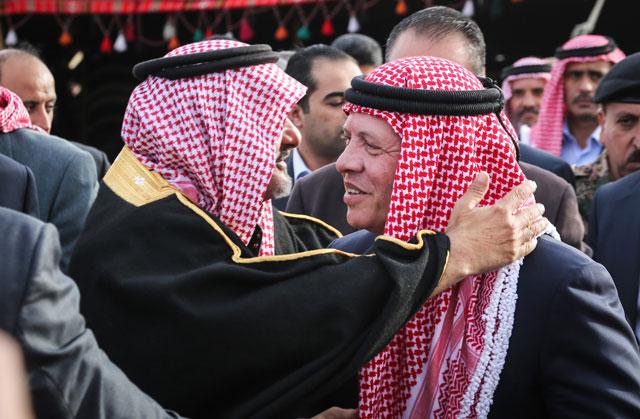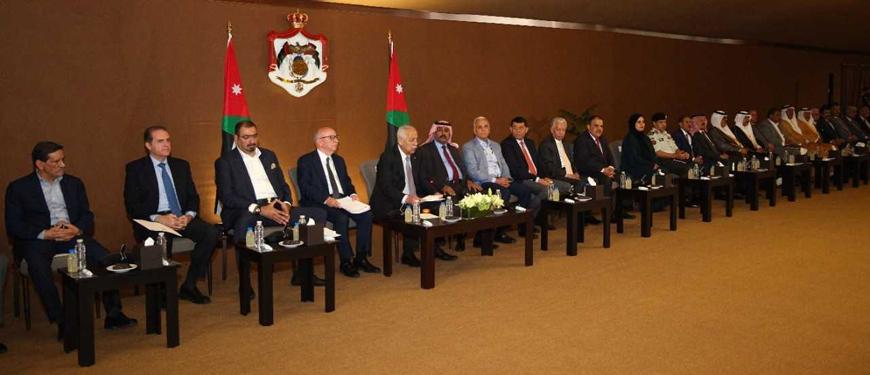You are here
King visits Southern Badia, urges efforts to fight poverty, unemployment
By JT - Dec 18,2014 - Last updated at Dec 18,2014

AMMAN — His Majesty King Abdullah on Wednesday expressed pride in the residents of Southern Badia region, “who are a main component of the Jordanian national fabric”.
During a visit to the area, where he met with several dignitaries and tribal leaders, the King said the meeting is in line with ongoing contacts "with my family members and brothers in the Southern Badia”, according to a Royal Court statement.
Stressing his commitment to learning firsthand the people's needs and ways to serve them and the country as a whole, the King said he was proud to be among “my Nashama brothers, my southern bedouin brothers” to learn about the challenges facing them “to be able to arrive at solutions”.
His Majesty said economic challenges are at the top of the Kingdom’s priorities, especially the problems of poverty and unemployment, stressing the importance of finding solutions for these challenges.
“There will be a greater focus on development projects to eliminate poverty and unemployment,” the King told Southern Badia leaders.
In addition, there will be more opportunities to recruit Jordanians in the Jordan Armed Forces-Arab Army and security bodies, His Majesty said, expressing hope that 2015 will bring about improvements at various levels.
Turning to efforts to combat terrorism and conditions on the “northern front at the Kingdom’s borders with Iraq and Syria”, the King reassured the region's representatives.
“There is a security strategy to confront these challenges, within the programmes of the Jordan Armed Forces and the security bodies,” he said.
On the repercussions of the Syrian crisis, the King said Jordan supports a political solution in Syria.
“We are working to arrive at this solution,” he noted, according to the statement.
The King stressed that despite the fact that the Islamic State (IS) group poses no direct threat to Jordan’s border, the Kingdom is cooperating with various parties to support efforts by Iraqi and Syrian tribes to counter the extremist group and defend their lands.
His Majesty reiterated that the Jordanian armed forces are shouldering their duties towards brethren and neighbours in conformity with the Arab Army slogan that all its soldiers carry.
“This is a historical duty and a source of pride for Jordanians. This [Arab Army] motto which gives Jordan a great positive role did not come by chance,” the King stressed.
IS, the King warned, is a danger that exceeds the borders of Syria and Iraq, and which targets all countries.
He emphasised that there are many challenges facing the Arab and Muslim world that “we as Arabs and Muslims have to counter”.
“This is what I talk about during my foreign visits. Today the anti-extremism war is our war, not the West’s,” the King asserted. “Extremism has to be fought at home, in school, the street and everywhere.”
He continued that radicalism is a momentous problem, particularly in light of poverty and unemployment.
“We cannot continue talking about problems outside Jordan and ignore the domestic situation. Thus we will continuously focus on the local economic situation, particularly poverty and unemployment,” he said.
In reply to remarks by speakers representing the Southern Badia region, the King emphasised the need to follow up on the demands of the area’s residents and work to find solutions to existing problems within the limits of the available capabilities in coordination with all concerned departments.
His Majesty stressed the importance of improving educational services in the area, and called for linking university specialisations with labour market needs to ensure that graduates get jobs after finishing their studies.
He also directed the concerned authorities to implement priority projects in the health, vocational training, housing and education sectors.
Speakers at the meeting voiced pride in and support of the Hashemite leadership and its efforts to serve the country and its higher interests.
The community leaders stressed that Southern Badia residents have always been “soldiers of the homeland”, standing behind the King on the path towards a better future for Jordan.
They commended His Majesty’s stances towards Arab and Islamic causes, the forefront of which is the Palestinian issue and the protection of Jerusalem’s Islamic and Christian sites, in addition to the support of “brothers” in Egypt, Iraq and Syria.
The badia leaders also stressed that they stand united in the face of those seeking to disturb Jordan’s security and borders, noting that no conspiracy can disrupt the unity of Jordanians.
“The Hashemite Throne will remain a red line,” they said, according to the statement.
The residents of the Southern Badia region “are aware of the challenges facing their homeland”, especially the threat of extremism and terrorist organisations that speak in Islam’s name although they have nothing to do with it, the leaders said.
Jordan, they added, will remain a country of stability and security, with the King’s leadership and the determination of its people.
Some of the speakers pointed out shortcomings on the part of the media in dealing with national causes and the challenges facing the country, especially those related to terrorism and extremism.
They called on journalists, preachers and administrative governors to highlight these challenges in order for Jordanians to better understand them and deal with them responsibly.
Some of the attendees also requested improvements to the services offered to the region’s residents and called for securing job opportunities for young people by establishing development projects in the area.
The meeting was attended by Royal Court Chief Fayez Tarawneh; King’s Office Director Jafar Hassan; Sharif Fawaz Zaben, the King’s adviser for tribal affairs; Royal Court Secretary General Yousef Issawi; Chairman of the Joint Chiefs-of-Staff Gen. Mashal Al Zaben; Public Security Department Director Gen. Tawfiq Tawalbeh; Gendarmerie Department Director Maj. Gen. Ahmad Sweilmin; and the governors of Maan, Karak, Aqaba and Tafileh.
Related Articles
AMMAN — Following His Majesty King Abdullah’s meetings with dignitaries and representatives of the Northern Badia last week and upon Royal d
His Majesty King Abdullah on Wednesday voiced his pride in the people of the Central Badia region, who "like all Jordanians, set an example of loyalty and sincere patriotism".
AMMAN — His Majesty King Abdullah on Sunday expressed his pride in the unity of Jordanians and assured them that addressing economic challen



















